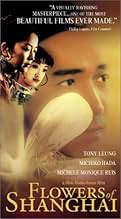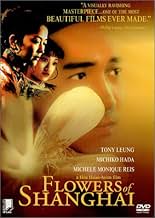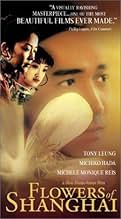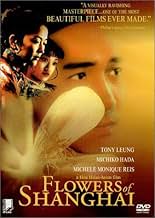IMDb रेटिंग
7.3/10
4.4 हज़ार
आपकी रेटिंग
अपनी भाषा में प्लॉट जोड़ेंIn the "flower houses" (upscale brothels) of Shanghai, various interweaving stories of love, loyalty, and deceit play out subtly.In the "flower houses" (upscale brothels) of Shanghai, various interweaving stories of love, loyalty, and deceit play out subtly.In the "flower houses" (upscale brothels) of Shanghai, various interweaving stories of love, loyalty, and deceit play out subtly.
- निर्देशक
- लेखक
- स्टार
- पुरस्कार
- 6 जीत और कुल 6 नामांकन
Tony Leung Chiu-wai
- Wang Lingsheng
- (as Tony Chiu Wai Leung)
Michelle Reis
- Emerald
- (as Michelle Monique Reis)
Carina Lau
- Pearl
- (as Carina Lau Ka-ling)
Rebecca Pan
- Huang
- (as Rebecca Pan Wan-ching)
Tony Chang
- Peking Opera Actor
- (as Tony Chang Ruei-che)
Yiu-Ming Lee
- Azhu
- (as Yu-ming Lee)
फ़ीचर्ड समीक्षाएं
10pcg
This hypnotically beautiful film may recall a dream, but the material world of money and power, indentured servitude and beatings everywhere intrudes on it. We discover in the contrasting stories of Emerald, Pearl, Crimson, Jade, and Crystal, how some survive as "flower girls" and others are crushed. Far from being boring or cold, the film is compelling dramatically and emotionally. "Flowers of Shanghai" seems to contain boundless reserves of sadness and rage -- it is as if the sex and violence are not on screen because Hou cannot bear to show them. If "Flowers of Shanghai" is an opium dream, as many have said, the opium is both bringing pleasure and suppressing pain.
"Flowers of Shanghai" shows compassion for its characters, both the innocents and those who survive through cynical manipulation. The scene-length takes in medium shots work to establish respect for each person within the film, while at the same time bringing about a kind of "rectification of names," systematically exposing the hypocrisy of the brothels. It's appropriate that one of the few moments of violent action in the film occurs when Master Wang smashes the exquisite interior decoration in a room: "Flowers of Shanghai" shows the seductive beauty of the brothel then reveals it to be a cage. Everyone in the film is on multiple levels unfree: the women are financially bound to the brothels and dependent on the whims of their clients, and almost everyone is addicted to opium.
The film never leaves the brothels. This expresses how the brothels in fact own the women. However, as Stephen Teo noted in CinemaScope, there's another detail that's easy to overlook: the women's bound feet prevent them from easily walking more than a few feet.
"Flowers of Shanghai" shows compassion for its characters, both the innocents and those who survive through cynical manipulation. The scene-length takes in medium shots work to establish respect for each person within the film, while at the same time bringing about a kind of "rectification of names," systematically exposing the hypocrisy of the brothels. It's appropriate that one of the few moments of violent action in the film occurs when Master Wang smashes the exquisite interior decoration in a room: "Flowers of Shanghai" shows the seductive beauty of the brothel then reveals it to be a cage. Everyone in the film is on multiple levels unfree: the women are financially bound to the brothels and dependent on the whims of their clients, and almost everyone is addicted to opium.
The film never leaves the brothels. This expresses how the brothels in fact own the women. However, as Stephen Teo noted in CinemaScope, there's another detail that's easy to overlook: the women's bound feet prevent them from easily walking more than a few feet.
This movie was absolutely brilliant.
It was filmed in a manner that makes it seem more realistic than most movies. Each frame is beautiful.
A note on dialect - This movie (with the exception of Leung to his mistress) is in Wu Chinese. Wu is hardly a minor language, spoken by well over 70 million people worldwide. It is spoken not only in Shanghai (the largest city in China) but the surrounding provinces, including such large cities as Suzhou and Wenzhou. It is actually more widely spoken than Cantonese and Taiwanese combined, making it the second-most-spoken variety of Chinese, dwarfed only by Mandarin. (70 million speakers is a lot of people; many national languages in Europe have fewer speakers) However, Wu is not spoken by as many overseas Chinese as are Cantonese, Mandarin, and Hokkien (aka Taiwanese, Minnan, etc), and for that reason less Westerners speak it. (in addition, Cantonese, Hokkien, and Mandarin are all the primary languages of at least one self-ruling political unit, even though the former two have less speakers than Wu)
This is the only well-known movie with dialogue primarily in Wu, and it is based on the 19th century Wu novel by the same name (except read as Wu).
It was filmed in a manner that makes it seem more realistic than most movies. Each frame is beautiful.
A note on dialect - This movie (with the exception of Leung to his mistress) is in Wu Chinese. Wu is hardly a minor language, spoken by well over 70 million people worldwide. It is spoken not only in Shanghai (the largest city in China) but the surrounding provinces, including such large cities as Suzhou and Wenzhou. It is actually more widely spoken than Cantonese and Taiwanese combined, making it the second-most-spoken variety of Chinese, dwarfed only by Mandarin. (70 million speakers is a lot of people; many national languages in Europe have fewer speakers) However, Wu is not spoken by as many overseas Chinese as are Cantonese, Mandarin, and Hokkien (aka Taiwanese, Minnan, etc), and for that reason less Westerners speak it. (in addition, Cantonese, Hokkien, and Mandarin are all the primary languages of at least one self-ruling political unit, even though the former two have less speakers than Wu)
This is the only well-known movie with dialogue primarily in Wu, and it is based on the 19th century Wu novel by the same name (except read as Wu).
10dave-593
Hou Hsiao-Hsien's "Flowers of Shanghai" is an opium dream of a movie: visually and aurally there is no mistaking that this is the work of an artist with the imagination of a poet, and the precision of a clockmaker. The opening shot is among the most exquisite in all of cinema: a veritable tour de force that exudes Hou's love for the film medium, but is decidedly restrained and controlled, never allowing style to upstage the narrative and degenerate into mere spectacle. In keeping with the film's setting and rules of patriarchy, the major male characters are introduced first. The women serving these men are then introduced in the following "chapters", each one preceded by title cards announcing their names and place of residence as if gently mocking or subverting the patriarchical order.
This chamberpiece drama of sexual intrigue and power struggle is astonishingly acute in capturing the feel and sensibilities of the late 19th century but expressed in very contemporary terms without any apparent compromises or contradictions. The painterly colors of "Flowers" may invite comparison with Dutch masters like Vermeer even when Hou is deliberately conjuring an idealized world that is as hermetic as it is artificial: a world composed entirely without natural light is like a dream, hauntingly beautiful and intense but impossible to hold or to keep. That the film is shot entirely indoors and the mise-en-scene is orchestrated without any close-ups is a testament of Hou's faith and supreme confidence in creating a work that remains completely cinematic while averting the pitfalls of feeling stage bound. Despite the subject matter what is also startling is the complete absence of physical sex on screen; and, yet the film manages to sustain an erotically charged atmosphere.
Beginning with "The Puppetmaster" Hou has been increasingly moving towards a more minimalist form of cinema, stripping the narrative of everything that is superfluous until nothing is left but its emotional core, naked and unadulterated. "Flowers" is very much an interior film that does not depend on voiceover narration to make thoughts explicit. Hou's almost static camera continues to favor long medium takes ranging from 5 to 7 minutes, framing key characters sharing the same space and time, but well within reach of each other, capturing the subtle interplay and nuances while allowing them to drift in and out of the picture frame according to their relative importance in the social hierarchy. In this manner an entire community is evoked: demonstrating that the window to the world is precisely through the interior lives of individuals responsible for shaping the body politic.
This chamberpiece drama of sexual intrigue and power struggle is astonishingly acute in capturing the feel and sensibilities of the late 19th century but expressed in very contemporary terms without any apparent compromises or contradictions. The painterly colors of "Flowers" may invite comparison with Dutch masters like Vermeer even when Hou is deliberately conjuring an idealized world that is as hermetic as it is artificial: a world composed entirely without natural light is like a dream, hauntingly beautiful and intense but impossible to hold or to keep. That the film is shot entirely indoors and the mise-en-scene is orchestrated without any close-ups is a testament of Hou's faith and supreme confidence in creating a work that remains completely cinematic while averting the pitfalls of feeling stage bound. Despite the subject matter what is also startling is the complete absence of physical sex on screen; and, yet the film manages to sustain an erotically charged atmosphere.
Beginning with "The Puppetmaster" Hou has been increasingly moving towards a more minimalist form of cinema, stripping the narrative of everything that is superfluous until nothing is left but its emotional core, naked and unadulterated. "Flowers" is very much an interior film that does not depend on voiceover narration to make thoughts explicit. Hou's almost static camera continues to favor long medium takes ranging from 5 to 7 minutes, framing key characters sharing the same space and time, but well within reach of each other, capturing the subtle interplay and nuances while allowing them to drift in and out of the picture frame according to their relative importance in the social hierarchy. In this manner an entire community is evoked: demonstrating that the window to the world is precisely through the interior lives of individuals responsible for shaping the body politic.
At the end of the 19th century, Chinese officials used to spend their leisure time in lush brothels in the British concession of Shanghai. Hou Hsiao-Hsien's 'Hai Shang Hua' depicts the intricate social network sustained in those premises by the customers, the girls (called flowers) and the Madams. The personal relations in those brothels were ruled by pleasure, money, love and social status in a perfect parallel to the 'outside' society, which, in turn, is perceived throughout the film almost as unreal. Hou is a master creating ambiences: the film transmits an extraordinarily subtle feeling of warmth and suffocation fostered by a miraculous music. With neither a beginning nor an end, this superb film is not apt for those looking for adventures and easy-to-tell stories.
I saw this film at Cannes where delegates, including would-be intelligent critics emerged from the film scratching their heads and mumbling 'interesting' - a sure sign that they couldn't understand a word of it. For me it had been an epiphanous experience.
Six months later Cahiers du Cinema voted it the best film of its year...
I am sure there is a word to describe the effect of the film, but I can't lay my hand on it, so I will say 'emotionally disjoint'. As the men sit around playing Mah Jong talking, generally of trivia, huge emotional dramas are going on, but obliquely, in relation to the girls in the brothel. The effect is crushing.
I thought, while watching, mainly of Jean-Marie Straub as it has a minimalist side, but with such greater emotional power and resonance. It is so tragic that this magnificent film has had such a poor release in the west - no theatrical distribution at all in the UK...
Six months later Cahiers du Cinema voted it the best film of its year...
I am sure there is a word to describe the effect of the film, but I can't lay my hand on it, so I will say 'emotionally disjoint'. As the men sit around playing Mah Jong talking, generally of trivia, huge emotional dramas are going on, but obliquely, in relation to the girls in the brothel. The effect is crushing.
I thought, while watching, mainly of Jean-Marie Straub as it has a minimalist side, but with such greater emotional power and resonance. It is so tragic that this magnificent film has had such a poor release in the west - no theatrical distribution at all in the UK...
क्या आपको पता है
- ट्रिवियाThe film consists of 38 long shots.
- कनेक्शनFeatured in Hai shang chuan qi (2010)
टॉप पसंद
रेटिंग देने के लिए साइन-इन करें और वैयक्तिकृत सुझावों के लिए वॉचलिस्ट करें
- How long is Flowers of Shanghai?Alexa द्वारा संचालित
विवरण
- रिलीज़ की तारीख़
- कंट्री ऑफ़ ओरिजिन
- भाषाएं
- इस रूप में भी जाना जाता है
- Flowers of Shanghai
- उत्पादन कंपनियां
- IMDbPro पर और कंपनी क्रेडिट देखें
इस पेज में योगदान दें
किसी बदलाव का सुझाव दें या अनुपलब्ध कॉन्टेंट जोड़ें

































